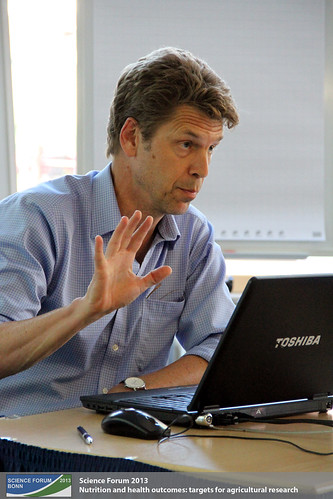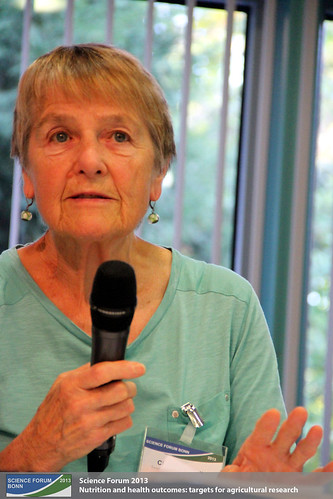Reply to comment
Two Sexes Are Quite Inadequate
Wed, 09/25/2013 - 10:50 — Philipp Gassner
‘It would be a thousand pities if women wrote like men, or lived like men, or looked like men, for if two sexes are quite inadequate, considering the vastness and variety of the world, how should we manage with one only?’
Virginia Woolf is quite right, as was reflected in Breakout Session 7,  exploring links between nutrition, health and the female domains of subsistence farming. In the latter, inequality persists in unequal opportunities, low representation of women in leadership and in continuing violence against women in all its forms. Two out of three illiterate adults are women. Every 90 seconds, a woman dies in pregnancy. And even though the figure of women accounting for 80% of agricultural production, while owning less than 2% of land, is now contested, women clearly contribute to agriculture and nutrition quite differently than men.
Obviously, 'The playing field needs to be leveled'.
Read more
How this can be done, Stuart Gillespie from IFPRI set out to show in his assessments of empowerment. Beyond crucial indirect forms like voting rights, anti-discrimination legislation and improved access, direct forms – be it cash transfer programs, agricultural interventions or microfinance – largely failed to empower and improve nutrition, he found out.
The Wow Factor
Jennifer Nielsen, HKI couldn’t agree more and stressed that change happens slowly. We should not look for the wow factor. Nevertheless, the presented case studies showed that change is in the cards: HKI’s Homestead Food Production helps Bangladeshi women in nontraditional roles or their Nepalese peers to the recognition of nutritional needs and the power to meet these. This also works in the face of climate change, where climate smart agriculture can create co-benefits of increased diet diversity and lower emissions. Christina Tirado, PAHO/WHO pointed out that such sustainable diets of 400 gram of fruits or veggies a day can save 27 million lives, especially of girls and women.
Rocking the Boat
exploring links between nutrition, health and the female domains of subsistence farming. In the latter, inequality persists in unequal opportunities, low representation of women in leadership and in continuing violence against women in all its forms. Two out of three illiterate adults are women. Every 90 seconds, a woman dies in pregnancy. And even though the figure of women accounting for 80% of agricultural production, while owning less than 2% of land, is now contested, women clearly contribute to agriculture and nutrition quite differently than men.
Obviously, 'The playing field needs to be leveled'.
Read more
How this can be done, Stuart Gillespie from IFPRI set out to show in his assessments of empowerment. Beyond crucial indirect forms like voting rights, anti-discrimination legislation and improved access, direct forms – be it cash transfer programs, agricultural interventions or microfinance – largely failed to empower and improve nutrition, he found out.
The Wow Factor
Jennifer Nielsen, HKI couldn’t agree more and stressed that change happens slowly. We should not look for the wow factor. Nevertheless, the presented case studies showed that change is in the cards: HKI’s Homestead Food Production helps Bangladeshi women in nontraditional roles or their Nepalese peers to the recognition of nutritional needs and the power to meet these. This also works in the face of climate change, where climate smart agriculture can create co-benefits of increased diet diversity and lower emissions. Christina Tirado, PAHO/WHO pointed out that such sustainable diets of 400 gram of fruits or veggies a day can save 27 million lives, especially of girls and women.
Rocking the Boat
 These women, however, cannot deliver everything, and we have to stop thinking so, Christine Okali, IDS, is convinced, who is ‘known for rocking the boat’. And rocking she did. She fundamentally picked holes in the 1980s concept of fixed gender roles which often result in an instrumental approach: 'Change women and then use them for your goals'. Instead, a gender relation approach does the complexity, diversity and dynamics of reality more justice, ‘if not, we can just walk away’. Not to keep women where they are, but acknowledging the changing status of men and women is key. This can’t work without shedding some light in the ‘black box’ household, as well as taking different histories, identities, and interests seriously.
If we seriously want to level the playing field, and further empowerment and nutrition, we need to put explaining processes on the Gender Agenda rather than just looking for impacts.
To take different perspectives surely won’t hurt. Considering the vastness and variety of the world, how should we manage with one only?
Christine Okali in interview
Read more on the environmental gender agenda
And check Christine Okali’s blog
These women, however, cannot deliver everything, and we have to stop thinking so, Christine Okali, IDS, is convinced, who is ‘known for rocking the boat’. And rocking she did. She fundamentally picked holes in the 1980s concept of fixed gender roles which often result in an instrumental approach: 'Change women and then use them for your goals'. Instead, a gender relation approach does the complexity, diversity and dynamics of reality more justice, ‘if not, we can just walk away’. Not to keep women where they are, but acknowledging the changing status of men and women is key. This can’t work without shedding some light in the ‘black box’ household, as well as taking different histories, identities, and interests seriously.
If we seriously want to level the playing field, and further empowerment and nutrition, we need to put explaining processes on the Gender Agenda rather than just looking for impacts.
To take different perspectives surely won’t hurt. Considering the vastness and variety of the world, how should we manage with one only?
Christine Okali in interview
Read more on the environmental gender agenda
And check Christine Okali’s blog
 exploring links between nutrition, health and the female domains of subsistence farming. In the latter, inequality persists in unequal opportunities, low representation of women in leadership and in continuing violence against women in all its forms. Two out of three illiterate adults are women. Every 90 seconds, a woman dies in pregnancy. And even though the figure of women accounting for 80% of agricultural production, while owning less than 2% of land, is now contested, women clearly contribute to agriculture and nutrition quite differently than men.
Obviously, 'The playing field needs to be leveled'.
Read more
How this can be done, Stuart Gillespie from IFPRI set out to show in his assessments of empowerment. Beyond crucial indirect forms like voting rights, anti-discrimination legislation and improved access, direct forms – be it cash transfer programs, agricultural interventions or microfinance – largely failed to empower and improve nutrition, he found out.
The Wow Factor
Jennifer Nielsen, HKI couldn’t agree more and stressed that change happens slowly. We should not look for the wow factor. Nevertheless, the presented case studies showed that change is in the cards: HKI’s Homestead Food Production helps Bangladeshi women in nontraditional roles or their Nepalese peers to the recognition of nutritional needs and the power to meet these. This also works in the face of climate change, where climate smart agriculture can create co-benefits of increased diet diversity and lower emissions. Christina Tirado, PAHO/WHO pointed out that such sustainable diets of 400 gram of fruits or veggies a day can save 27 million lives, especially of girls and women.
Rocking the Boat
exploring links between nutrition, health and the female domains of subsistence farming. In the latter, inequality persists in unequal opportunities, low representation of women in leadership and in continuing violence against women in all its forms. Two out of three illiterate adults are women. Every 90 seconds, a woman dies in pregnancy. And even though the figure of women accounting for 80% of agricultural production, while owning less than 2% of land, is now contested, women clearly contribute to agriculture and nutrition quite differently than men.
Obviously, 'The playing field needs to be leveled'.
Read more
How this can be done, Stuart Gillespie from IFPRI set out to show in his assessments of empowerment. Beyond crucial indirect forms like voting rights, anti-discrimination legislation and improved access, direct forms – be it cash transfer programs, agricultural interventions or microfinance – largely failed to empower and improve nutrition, he found out.
The Wow Factor
Jennifer Nielsen, HKI couldn’t agree more and stressed that change happens slowly. We should not look for the wow factor. Nevertheless, the presented case studies showed that change is in the cards: HKI’s Homestead Food Production helps Bangladeshi women in nontraditional roles or their Nepalese peers to the recognition of nutritional needs and the power to meet these. This also works in the face of climate change, where climate smart agriculture can create co-benefits of increased diet diversity and lower emissions. Christina Tirado, PAHO/WHO pointed out that such sustainable diets of 400 gram of fruits or veggies a day can save 27 million lives, especially of girls and women.
Rocking the Boat
 These women, however, cannot deliver everything, and we have to stop thinking so, Christine Okali, IDS, is convinced, who is ‘known for rocking the boat’. And rocking she did. She fundamentally picked holes in the 1980s concept of fixed gender roles which often result in an instrumental approach: 'Change women and then use them for your goals'. Instead, a gender relation approach does the complexity, diversity and dynamics of reality more justice, ‘if not, we can just walk away’. Not to keep women where they are, but acknowledging the changing status of men and women is key. This can’t work without shedding some light in the ‘black box’ household, as well as taking different histories, identities, and interests seriously.
If we seriously want to level the playing field, and further empowerment and nutrition, we need to put explaining processes on the Gender Agenda rather than just looking for impacts.
To take different perspectives surely won’t hurt. Considering the vastness and variety of the world, how should we manage with one only?
Christine Okali in interview
Read more on the environmental gender agenda
And check Christine Okali’s blog
These women, however, cannot deliver everything, and we have to stop thinking so, Christine Okali, IDS, is convinced, who is ‘known for rocking the boat’. And rocking she did. She fundamentally picked holes in the 1980s concept of fixed gender roles which often result in an instrumental approach: 'Change women and then use them for your goals'. Instead, a gender relation approach does the complexity, diversity and dynamics of reality more justice, ‘if not, we can just walk away’. Not to keep women where they are, but acknowledging the changing status of men and women is key. This can’t work without shedding some light in the ‘black box’ household, as well as taking different histories, identities, and interests seriously.
If we seriously want to level the playing field, and further empowerment and nutrition, we need to put explaining processes on the Gender Agenda rather than just looking for impacts.
To take different perspectives surely won’t hurt. Considering the vastness and variety of the world, how should we manage with one only?
Christine Okali in interview
Read more on the environmental gender agenda
And check Christine Okali’s blog 



